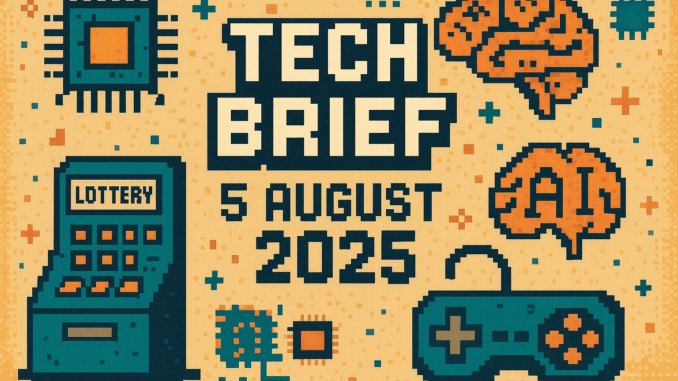
“Tech Brief 5 August 2025” lands with a cascade of upgrades, bold predictions, and a philosophical puzzle reimagined for digital natives. Whether you’re here for the silicon, the spectacle, or the strange, today’s stories pull together threads from Britain’s tech past and present without pretending there’s a tidy theme.
Missed yesterday’s Tech Brief? Catch up here before diving in.
National Lottery Returns After Major Tech Upgrade
“Thirty-one years of hardware, all swapped in a weekend,” said one engineer, still clutching a battered service manual from the 90s. The UK National Lottery resumed after its largest-ever tech overhaul, suspending draws nationwide so operator Allwyn could modernise store terminals. This was not just a software patch. The project replaced thousands of retail machines, many with roots in 90s British computing. The original terminals, as flagged in historical maintenance records, were notorious for thermal printer jams and keypad failures.
Now, new hardware promises faster scans and tighter security, but also a clean break from the tactile quirks that defined the Lottery experience for a generation. For anyone who’s queued at a corner shop or remembers the whirr-click of old kit, infrastructure upgrades are rarely just technical. They’re cultural resets, swapping the familiar for something slicker, but less storied.
AI Start-up Secures £3m to Challenge Rightmove
How do you disrupt a digital institution like Rightmove? For one UK proptech start-up, the answer is AI-powered property search, backed by £3 million in fresh funding. The platform claims to use machine learning to surface “hidden gems” and predict property trends, a far cry from the late 90s to early 2000s days of dial-up and clunky virtual tours.
Back then, estate agents debated whether online listings would ever replace the high street window. Now, algorithms promise to anticipate your next move before you’ve even clicked. The technical leap is real, but so is the nostalgia for simpler browsing. Industry insiders are watching for substance over hype. Will this be a true leap or just another digital coat of paint? The story is still writing itself, and the next few months will reveal whether AI can really change the way Britain buys and sells homes.
Demis Hassabis: AI’s Impact May Outpace the Industrial Revolution
Demis Hassabis, co-founder of Google DeepMind, is not known for understatement. This week, he declared that AI could transform society “ten times more than the Industrial Revolution, and ten times faster.” That’s a bold claim, especially from a British researcher whose early work drew on both ZX Spectrum games and Cambridge maths.
Hassabis’s warning is twofold: the benefits of AI may not be evenly spread, and the pace of change could leave many behind. It’s a familiar tension for anyone who grew up with both utopian and doomsday tech headlines. The challenge is to balance excitement with caution. Hassabis’s remarks echo the same debates that once surrounded the arrival of the microcomputer; only now the stakes are global. As above, the story isn’t just about new hardware or code. It’s about who gets to shape the future, and how quickly the rules are rewritten.
“The Trolley Solution” Turns Classic Moral Dilemma into Viral Game
Would you pull the lever? That’s the question at the heart of “The Trolley Solution,” a new indie game reimagining Philippa Foot’s famous 1967 thought experiment for the meme age. The game trades on the viral popularity of the trolley problem, weaving bespoke puzzles with real-world ethical conundrums.
Anyone who remembers cassette-based adventure games will spot a striking blend of academic legacy and digital remix. Developers say the project is as much about sparking debate as play. By gamifying philosophy, they invite players to confront uncomfortable choices, not just click through them. There’s no tidy answer here, only a reminder that the digital world keeps finding new ways to repackage the oldest questions.
From the Wayback Machine
On This Day: 1914 – First Electric Traffic Light Installed in Cleveland
The world’s first electric traffic light system appeared on Cleveland’s Euclid Avenue in 1914, designed by James Hoge. This early system used red and green bulbs, a manual operator, and a buzzer to manage a chaotic intersection of cars, streetcars, and horses. The interlocking circuit prevented conflicting signals, a safety feature still essential in modern traffic control. Hoge’s invention paved the way for networked urban automation, influencing everything from city planning to the expectation of clear, machine-driven feedback at every crossing. While today’s systems are sensor-driven and automated, the core challenge of managing urban movement remains much the same as it was over a century ago.
What This Means
Tech Brief 5 August 2025 highlights how British tech culture is always in flux, from lottery terminals to AI ethics. The tension between nostalgia and progress is alive in every upgrade, debate, and game. The question isn’t whether change is coming, but how we’ll shape it and who gets a say.
Keep your soldering iron close, and your bookmarks closer. Let’s see what tomorrow brings.
Missed yesterday’s Tech Brief? Catch up here

Leave a Reply